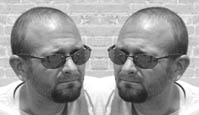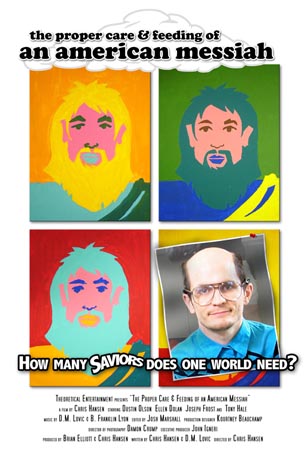Have you ever had one of those days when you feel like everything just clicks? Today was one of those days in my two classes this semester.
(Incidentally, I'm not entirely sure I should tag this post with the new media tag, because I'm not sure there's any talk of new media, but since it's teaching-related, I decided it was relevant enough).
First up was my Directing class. For the next few weeks, we're partnered with the Theatre Department's Camera Acting class. The directors from my class have been given a scene with dialogue that could be taken a number of different ways. They are then assigned two actors to play the scene, and they must communicate to the actors their interpretation of the scene, rehearse it for 20-30 minutes (with me and my colleague, Prof Thomas Ward from the Theatre Department, observing the rehearsal process), and then perform it. After the performance, the entire class (or, rather, both classes -- actors and directors) critiques the scene and the process of getting to the end result.
I was a little skeptical and concerned that this wouldn't work, but I was wrong. This seemed to be a great learning experience in that we were able to challenge what the directors were asking the actors to do, how much information they were offering, and -- though it might not seem important to a novice -- what words they were using to communicate these things. We were also able to critique the actors' processes. In writing about it now, I'm not sure it sounds as interesting as it was, but it seemed to me that it worked well as a learning-by-doing experience. I could tell the directors in a lecture that they need to communicate in terms of the characters' objectives and what tactics they use to achieve them in the scene (and in fact we did a little of that in preparation earlier this week); but actually letting them direct and then critiquing the process that got them to their end result was a much more direct learning experience.
Later, I had my graduate Documentary seminar. The class has been good so far but also a little dry. Discussion hadn't yet gotten at some of the deeper issues. But today featured our first screening of short documentary projects done by groups of students. And wow -- what a difference "doing" makes in the process of learning.
I don't want to get into tons of detail because these were projects intended for the classroom and not for general distribution. But one of them featured a 'direct cinema' approach (which was part of the assignment) in which the filmmakers "lucked into" a dramatic situation in which one of the subjects in their documentary was put into an embarrassing situation. I won't be more detailed than that because it's not necessary, but let me just say that the person in question was in an awkward situation and ended up in tears, and of course all of this was caught on camera.
Now, when we finished watching this footage that turned out to be quite compelling regardless of the fact that it wasn't particularly well lit or shot (and the sound wasn't great either), we got into a fascinating discussion about the ethical boundaries presented by this situation.
Should they have showed this person's pain and embarrassment without their being some greater lesson for us? Or was that exploitative? Should they not have filmed it? Or not have edited the piece to make that embarrassing moment into the main feature?
It did happen 'just that way," so the student filmmakers did not manipulate the situation or the editing of it. One of them, in fact, said that in the four-plus hours that they taped, this awkward event constituted almost two hours - so it was, proportionally-speaking, a large part of the larger event.
So there was the ethical discussion of the appropriateness of actually exhibiting the footage and making it part of the film, but there was also the question of the objective nature of the direct cinema style. We have been talking about that style and how the proponents of it use it because they feel it is more "truthful" to present the events unvarnished by non-diegetic music, voice-over, or interviews. They just show the events as they occur, without anything getting in the way.
But one of the filmmakers said that he desperately wanted to include voice over narration or something that would place the whole occurrence in context. He felt that they were NOT showing "what occurred" because what occurred happened over four or more hours, and what they were showing comprised ten minutes of summary. In other words, it wasn't "objective" at all because they had to select footage (a very subjective process), and their belief was that the extra-diegetic stuff like voice over and interviews, rather than ruining the objectivity, would have allowed the filmmakers to put this ten minutes of footage into the larger context of the whole event.
Regardless of your opinions on these issues, I walked away from the class thrilled that we had had this shared learning experience centered around the making of this short documentary project. We learned more about balance, objectivity, and ethics in that one discussion than I could ever elicit from abstract conversations about these ideas.
Labels: baylor_nms_s10, directing, documentary, teaching


